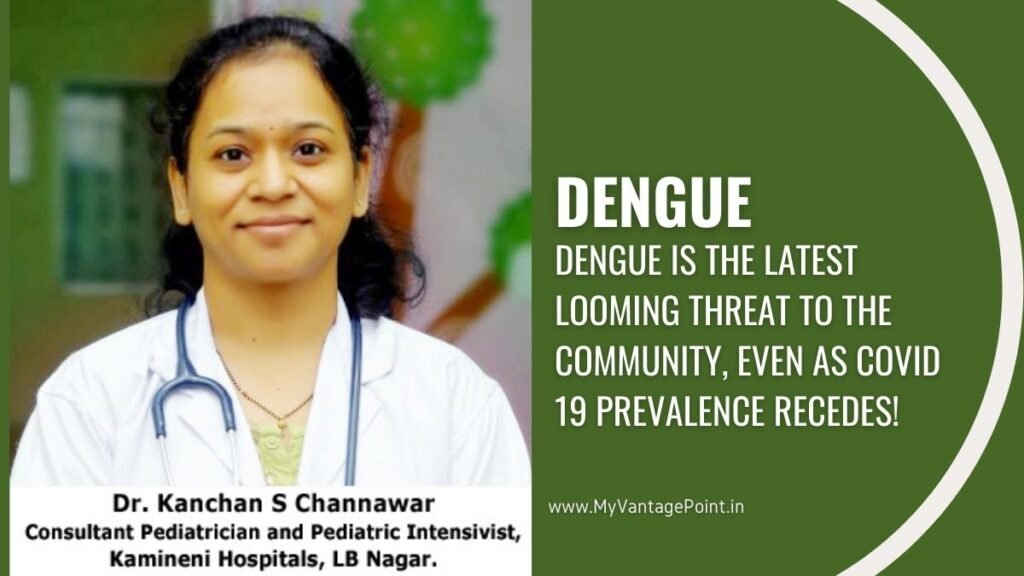
In the current pandemic situation, one more dreaded disease Dengue is raising serious concerns, as we continue to combat COVID-19. The prevalence of dengue has grown dramatically in recent decades.
The disease is endemic in more than 100 countries all over the world. A rapid rise in urban population is bringing an ever greater number of people into contact with the vector especially in areas that are favorable for mosquito breeding like household water storage is common & where solid waste disposable services are inadequate.
The incidence of dengue is seen in all age groups. The classical presentation is usually seen in older children, adolescents & adults, but the severity is more seen in infantile age that is children who are less than 1 year old and adolescents where they have more serious and complicated dengue.
Dengue is a mosquito-borne Viral infection that causes mild to very severe disease. It is transmitted mainly by the Aedes Aegypti mosquito which also causes other infections like Chikungunya, Yellow Fever. Dengue is caused by 4 related viruses as Dengue Virus 1, 2, 3 & 4 for this reason, a person can be infected with Dengue Virus as many as 4 times.
Life-threading Dengue often requires hospital care. However, mild symptoms of Dengue can be confused with other viral illness that causes fever, headache, rash, body pains. Generally, symptoms of Dengue last for 2 to 7 days, and most of the kids will recover after about 1 week.
Occasionally Dengue develops into a potentially lethal complication called Severe Dengue. Severe Dengue develops in 1 in 20 people who got Dengue infection. It can present as a shock, bleeding in an internal organ, or even death.
Infants and pregnant women are at risk of severe dengue. Warning signs of severe dengue are abdominal pain or tenderness, three or more vomiting in 24 hours, blood vomiting, bleeding from nose and gums or in urine and stool, the child being restless, irritable, etc.
Unusual presentation of patients with severe organ involvement such as liver, kidneys, brain, or heart associated with dengue infection is termed as Expanded Dengue.
These unusual manifestations may be due to co-infections, co-morbidities, or complications of prolonged shock. The consequences of Expanded Dengue on these organs can lead to multiple complications.
Expanded Dengue in Central Nervous System can lead to encephalitis, seizure, or intracranial bleed. Gastrointestinal involvement can result in inflammation of the liver, gall bladder, bile duct, or pancreas.
Renal involvement may cause acute renal failure, damage of kidney’s small blood vessels, or kidney tubule cells. It can lead to complications of the heart like irregular or abnormal heartbeat, impact heart’s blood pumping ability, heart muscle inflammation, or even extra fluid accumulation around the heart.
Respiratory involvement presents as pulmonary edema, Acute Respiratory Distress Syndrome and accumulation of fluids in the lung etc. Sometimes Expanded Dengue can also lead to complications in the eye and rarely visual impairment may also be seen.
Dengue is severe in children and adolescents and its essential to follow some preventive measures to safeguard them. Indoors should be made safe and clean to prevent mosquito breeding.
Need to keep the corners and under surfaces of furniture clean. Should avoid standing water inside the house and spray mosquito repellents in the garden area. Strong immunity must be built-in kids by ensuring immune boosters like curd, fruits, garlic, turmeric, and dry fruits in a regular diet.
Need to ensure that children wear full-sleeved clothes and are protected from mosquito bites, especially when they go out to play. Usage of repellents enables protection from mosquito bites.
For an ailment like Dengue, which can turn fatal, prevention will always be better than cure, and it’s essential to know when to visit the doctor. Symptoms like fever, rashes over the body, headache, vomiting, or body pains are all signs of being cautious, and a visit to the doctor can always be beneficial.
Today’s Best Deals: Click Here
Read More:
- Budding Chefs Celebrate International Yoga Day at Regency College of Culinary Arts!

- Stretching Beyond Books: Resonance Educational Institutions Students Celebrate International Yoga Day with Isha Foundation!

- India’s First Successful Transcatheter Transatrial Mitral Valve Replacement Surgery Performed at Lilavati Hospital

- Reaviva Holistic Health: Redefining Wellness by Combining Advanced Science with Luxury Care

- Merino’s Daily Mid-Day Meal Program: Supporting Young Minds and Celebrating National Nutrition Week




